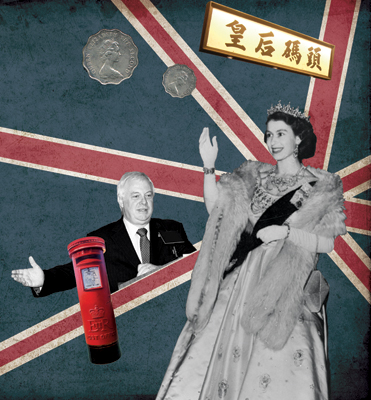The Hong Kongers who hanker for the colonial era
Reporter: Carmen Shih and Gienne Lee
His ringtone is “God Save the Queen”, the wallpaper on his mobile phone is the flag of colonial Hong Kong and he has deliberately cultivated an English accent. There is no doubt that Kay Ng Hong-ning is an Anglophile.
He is also a 19-year-old first-year student at HKU SPACE who was just five years old when Hong Kong was handed over to the People’s Republic of China in 1997 – too young to remember much about the colonial days.
While Ng may seem a bit extreme, he is not the only Hong Konger to feel nostalgic about the colonial days. The flag of the colony is now spotted in almost every street protest in the territory. Just search for “British Hong Kong” on the internet and you will find Facebook groups such as “I am a British Hongkonger” which has almost 100,000 followers.
It is perhaps easier to understand why certain middle-aged Hongkongers would reminisce about the old days but what about those who were infants when Hong Kong was still under British rule?
Ng feels he was brought up in a “British cultural environment”, citing examples of the British legacy like British-style street names and the city’s common law system.
He said this backdrop inspired him to find out more about colonial Hong Kong and his research later developed into an intense interest in the city’s former colonial master. He has read all kinds of books about Britain; books on its history, its culture and its political system, plus travel guidebooks and even cook books.
But this obsession did not come from his parents who were never associated with the colonial establishment or instilled such fascination for Britain in him.
He does, however, recall that when he was a child, his grandmother once told him about the celebrations for Queen Elizabeth II’s coronation in 1953. She said there were festive decorations everywhere in Hong Kong. She also told him many considered it an honour to have a glimpse of the queen during her visit to the territory in 1975.
While studying to become a legal executive at HKU SPACE, Ng learnt about the Hong Kong legal system and how it was modelled on the British one. Even the city’s constitution, the Basic Law, is drafted with the principle of common law in mind and is fundamentally different from the mainland’s legal system.
So strong is Ng’s identification with Britain that he would rather put in Hong Kong or GBR (the ISO country code for the United Kingdom of Great Britain) when he is asked to state his nationality in application forms.
Ng does not deny that he is clearly in the minority among his age group. He considers himself lucky that his friends do not see him as a freak because of his relatively unusual interest.
He insists that being nostalgic about the colonial days does not mean that he is living in the past. While acknowledging colonialism is aggressive by nature and had caused harm to the territory, Ng says: “The local Hong Kong culture was born [during the colonial period] which is neither from China nor Britain. That’s why I don’t want people to forget what the British have done to Hong Kong, both the good and the bad.”
Perhaps reminiscing about the city’s colonial past is just a pretext for these young people to reinforce their identity as Hongkongers.
Quite a number of Hong Kongers feel uneasy about the fact that Hong Kong became part of China in 1997 because of the huge differences across the border.
Another 19-year-old, Ivan Chik Yu-hin, says: “I can’t help but feel that we are not In the same boat, and hence we need to have a separate identity.”
Chik, who is currently studying law at the University of Warwick in the United Kingdom, says he was too young to remember what the colonial days were like but he concludes that: “British Hong Kong was definitely better than today’s Hong Kong.”
He justifies his position with his own analysis and interpretation of information he has obtained from the media and statistics and surveys about the differences between pre- and post-1997 Hong Kong. His conclusion is that there was much better communication between the top officials and the public, and people were more satisfied with the government than they are now.
“I think it would be wrong to say I prefer British Hong Kong, because after all it was colonial rule. But I don’t prefer today’s Hong Kong either. . .I put my hope in the future Hong Kong when what’s been promised in the Basic Law turns to reality,” he says.
Lau Siu-lun, a sociologist at the Chinese University of Hong Kong, puts down this phenomenon of young people reminiscing about a period of which they have little first-hand experience to the lack serious research and debate about Hong Kong’s experiences in that era.
“Today’s society lacks the ability to see things in a macroscopic way,” says Lau. “It is normal for people to reminisce about the past, when the reality now isn’t so great.”
Lau believes it is hard for Hong Kong to move forward without thoroughly reflecting on and analysing of its past. “It’s like keeping a relationship; if you break up with a partner without reflecting on what went wrong, you will keep on breaking up,” he says.
Those who were children during the last days of Hong Kong’s colonial administration are now adults. Some of them want to further explore their identity and the city’s colonial past. But they have few sources, except the official version, to refer to during their exploration.
This could explain why some of them tend to imagine an ideal past and glorify colonial rule on the basis of one or two facts or tales told by the past generation.
While some young people like Ng and Chik may feel nostalgia about a period they barely experienced, others who have lived most of their lives under colonial rule can confuse the reality of the period with an idealised memory of the “good old days”.
“I got a pay rise every year when Wilson and Patten were governors of Hong Kong,” says Mr Chan Wan-leung, who worked as a company chauffeur in the 1990s and is now in his fifties.
He attributes his annual pay rises to the administration of the two governors and points out he never got increases after 1997, conveniently forgetting the intervening Asian financial crisis.
Terence Chang Cheuk-cheung, headmaster of the elite Diocesan Boys’ School, recalls a time when life was more carefree. He says that when he was a DBS student, he had no pressure from examinations and cared less about marks. Unlike students nowadays, he did not need to go to tutorial classes after school.
Chang says there was also greater social mobility before the handover. In the past, a Form Five graduate could be a police inspector while a Form Four graduate could qualify as a civil servant. Today, a degree holder can only be a police officer.
However, Chang does not believe these differences can be attributed to the change in sovereignty.
For Yeung Sum, a veteran former legislator and former leader of the Democratic Party and an associate professor of social work at Hong Kong University, credit should be given where it is due.
Yeung cites a professional civil service, a well-established legal system and world-class social infrastructure as the best contributions the colonial administration made to Hong Kong. “Foreign companies set up their factories in China and their headquarters in Hong Kong because of our mature legal system,” says Yeung.
However, he also points to the downside of British rule. “Hong Kong citizens had no say at all,” Yeung says. He explains that before 1991, all legislators were appointed by the governor and the government implemented policies with little or no public consultation.
The cultural critic, author and academic Chin Wan-kan (also known as Chin Wan) says Britain strategically imposed a sense of “dependency” on Hong Kong before 1997, which harmed people’s sense of autonomy.
“Hong Kong people are not used to solving problems on their own,” says Chin. “That is because most of the standards in various professions, like accountancy and law, were well established by the British before the handover. People who want to be an accountant or a lawyer must sit for examinations officially recognised by Britain”
Chin adds that British experts would be called in to help solve problems whenever Hong Kong encountered any hardships. Its previous over-dependence on Britain has made it hard for Hong Kong to make any advances on its own.
The use of English is another thing that the colonial government imposed on Hong Kongers.
Chin recalls how a classmate regularly misbehaved and only worked hard at English. The classmate told Chin that he could find a good job working in a foreign company or as a sailor, as long as his English was good enough. The syllabuses at that time only focused on the practical approach to English such as grammar and formal letter writing in order to drill students to be civil servants.
The colonial education system was mainly geared to producing functionaries rather than fine minds. Chin says schools seldom emphasised the cultural importance of western culture, such as Greek philosophy and English literature. “The culture of Hong Kong people is shallow,” he says.
It seems the British government did not prepare Hong Kong for long-term development, even in terms of its economy.
According to Chin, the only pillar of Hong Kong’s economy is financial services and people are obsessed with the stock market. However, the colonial government ignored the fact that primary and secondary industries are crucial to people’s livelihoods.
The government remained indifferent when more and more factories moved to the mainland and agriculture and the fishing industry were allowed to decline..
Some may idealise the colonial past and point to it as a golden age in contrast to an unsatisfactory present. Others may want to hold on to cherished memories of what seemed to be simpler times. Whatever the case, the colonial past is part of Hong Kong’s history.
“There is no hope in the future if we forget out past,” says Yeung Sum.












































A quality feature that unravels the dilemma of being a Hongkonger.